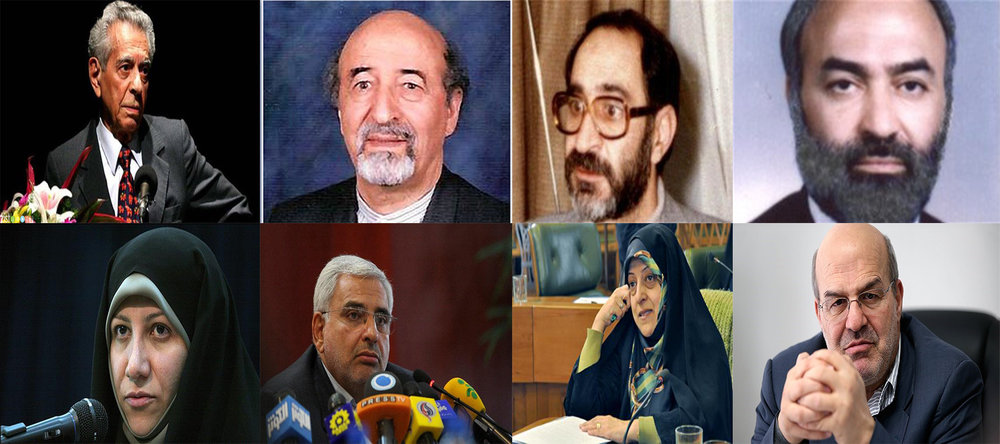Environment chiefs of Iran in a snapshot

TEHRAN — Since the establishment of Iran’s Department of Environment (DOE) in 1967 ten persons have taken over its presidency.
Today’s DOE was first set up as a fishing and hunting regulatory agency by Eskandar Firuz. He strived to change the agency’s name and eventually in 1971 it was renamed to the Department of Environment.
Firuz is called the father of Iran’s environment protection, headed the department for 10 years and was the first person who actually introduced the concept of environment to the Iranian within a legal framework.
Firuz is the first ever Iranian appointed as the vice-president for United Nations Conference on the Human Environment, held in Stockholm in 1972. He was a member of the presiding board of International Union for Conservation of Nature (IUCN) in 1973-75. In 1977 he was offered a job as IUCN director general which he turn down.
In an interview with Zistboom, an environmental website, published on March 5, 2015, Firuz has regretted that not so many countries in the world has ever harmed its environment as Iran; managers must understand that environment should be a priority in all decision making processes.
Mohammad Darvish, an official with DOE has told Mehr news agency that Firuz was the first person who spoke of sustainable development in Stockholm Conference in 1972 saying that in case the world continue to consume the resources in the same manner the Earth would not be able to meet their needs in near future.
“His projection actually came true in 8 years when in 1980 human demands equaled Earth’s sustainable supply,” Darvish added.
Hossein Akhani, environment professor at University of Tehran, also highlighted that Firuz has established DOE when no one truly knew anything about the environment not only in the Middle East but also in western countries. According to Akhani he played a key role in adoption of Ramsar Convention on Wetlands of International Importance, and registered many biosphere reserves and national parks.
After Firuz resigned from his post at DOE in 1978, Manouchehr Fili, Abbas Samei, and Taqi Ebtekar each headed the DOE for very short time until 1981.
In 1981 Reza-Hossein Mirzataheri became the then DOE chief for four years. After Mirzataheri Hadi Manafi, a physician who had also served as the Health Minister, directed the department for almost 13 years.
As Akhani put it well none of the environment chiefs appointed after Firuz had any environmental background and did nothing for the environment.
In 1998, Masoumeh Ebtekar, daughter of Taqi Ebtekar, became the chief of DOE. Ebtekar was named one of the seven 2006 Champions of the Earth by the United Nations.
After Ebtekar, Fatemeh Vaez-Javadi became the chief and was succeeded by Mohammad Javad Mohammadizadeh who according to Darvish preferred industrial development to the environment.
With President Hassan Rouhani taking office in 2013 Ebtekar was re-elected as chief of environment. She was harshly criticized during her second term, however, as Darvish believes she was the reason environmental issues became a “front-page headline”.
The media’s attention turned to environment for the first time in years, Darvish noted.
Now, with Rouhani returned to office again, Ebtekar was replaced with Isa Kalantari. Kalantari served as agriculture minister during the Akbar Hashemi Rafsanjani presidency from 1989-97 and the first year of President Mohammad Khatami’s administration from 1997-98.
Kalantari holds a BSc in agriculture from Urmia University, an MSc in physiology-biochemistry from Iowa State University, and a PhD in agricultural physiology from University of Nebraska.
He has also served as the advisor to president Rouhani in water, agriculture and environmental affairs. In February 2014, he was appointed as the chairman of a committee tasked with restoration of Lake Urmia.
Regarding Kalantari’s educational and occupational background he must be considered as the best person for the post. However, his policies during his time as the Agriculture Minister and the fact that he is pro genetically modified food has aroused some concerns. Kalantari, himself, can be partially held guilty of today’s environmental damages.
However, Akhani said, being head of Lake Urmia restoration program for three years and saving the lake from total dryness has certainly changed him; he now criticizes the country’s water policies.
As Darvish highlighted, Kalantari’s strong suit is his bravery and frankness, qualities which are hard to come by among other officials; he has confessed he made mistakes during his term as Agriculture Minister.
In his inaugural speech on August 14 he said that water scarcity is Iran’s major concern and the situation is ‘disastrous’.
MQ/MG
Leave a Comment